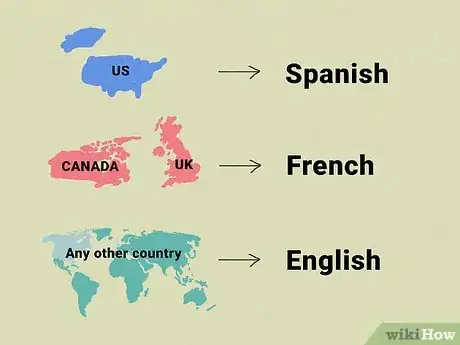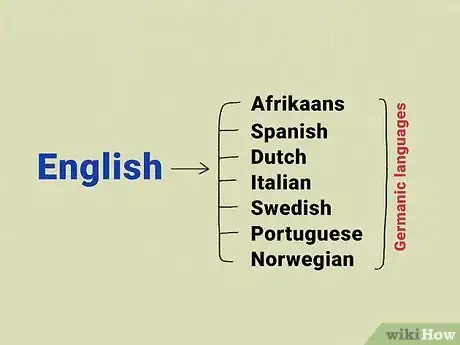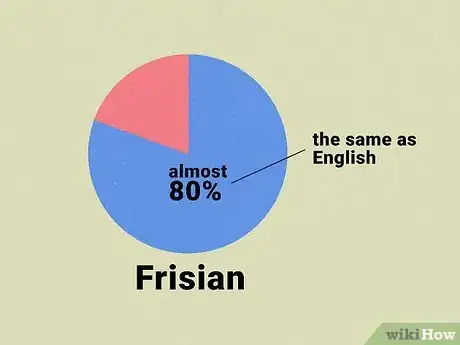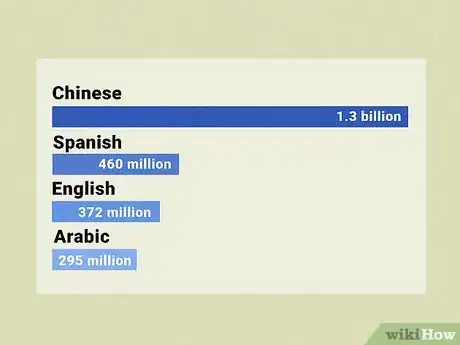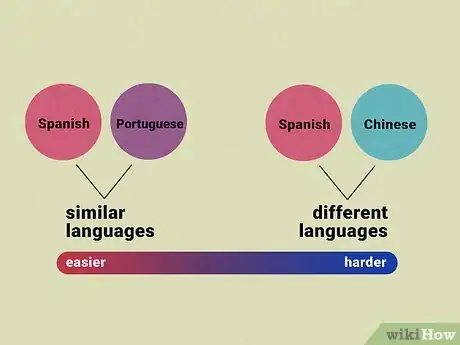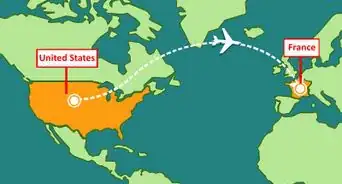This article was co-authored by Tian Zhou and by wikiHow staff writer, Hannah Madden. Tian Zhou is a Language Specialist and the Founder of Sishu Mandarin, a Chinese Language School in the New York metropolitan area. Tian holds a Bachelor's Degree in Teaching Chinese as a Foreign Language (CFL) from Sun Yat-sen University and a Master of Arts in Teaching English to Speakers of Other Languages (TESOL) from New York University. Tian also holds a certification in Foreign Language (&ESL) - Mandarin (7-12) from New York State and certifications in Test for English Majors and Putonghua Proficiency Test from The Ministry of Education of the People's Republic of China. He is the host of MandarinPod, an advanced Chinese language learning podcast.
There are 11 references cited in this article, which can be found at the bottom of the page.
This article has been viewed 9,925 times.
Learning a new language can open up tons of possibilities: a new career, easier travel, or better tourism. Picking a language to dedicate your time to can be tough, especially since there are so many to choose from. We’ve answered some of your questions so you can pick the right language for your needs to start learning right away.
Steps
What is the most useful foreign language to learn?
-
1If you’re in the US, Spanish can be really useful. It’s the second most spoken language in the country (after English). It can help you talk to people who already live here, and there are tons of resources to get you started.[1]
- Latin America is also a pretty close travel destination, so you can put your skills to good use when you travel.
-
2If you’re in the UK or Canada, French is pretty helpful. Many French-Canadians already speak French, so it can be a useful tool for talking to your neighbors. In the UK, you’re only a few hours by train ride from France, so it can be a good language to know when you’re traveling.[2]
- French media is very popular, so you’ll be able to find plenty of films and TV shows to enhance your skills.
Advertisement -
3If you’re anywhere else, English might be a good place to start. English is spoken in almost every country in the world, no matter where you go. It’s estimated that around 1.5 billion people speak English, so you’ll always have someone to talk to.[3]
- You can use English when you travel and for career opportunities.
What language is the easiest to learn?
-
1If you speak English, a Germanic language will be the easiest. That includes Afrikaans, Spanish, Dutch, Italian, Swedish, Portuguese, and Norwegian. The general syntax is the same, so you won’t have to work as hard to figure out the rules.[4]
- Although German is a Germanic language as well, it’s one of the oldest Germanic languages, so it’s a little bit harder to learn.
-
2Any language that has a similar alphabet will be easier. Most Germanic languages use alphabets that are similar to the English alphabet. If you already know the letters, you’ll have an easier time learning the language.[5]
Which language is the most similar to English?
-
1Frisian. It’s a language spoken in the Netherlands, Denmark, and Germany. Almost 80% of it is the same as English, so you won’t have to spend a long time learning new vocabulary.[6]
- The specifics of Frisian sometimes change depending on where you are in the region. Northern Frisian is slightly different from Western Frisian, for example.
-
2German, Norwegian, and French are also fairly similar. Plus, they’re more widely spoken. They also share a lot of the same vocabulary with English, and the dialects are similar, too.[7]
- Although German and English come from the same root language, it’s a pretty tough language for English speakers to learn. That’s not to say you can’t do it, but you should be prepared to hunker down and do some serious studying if you choose it.
What is the number one language in the world?
-
1Almost 1.3 billion people speak Chinese. However, there are over 10 varieties of Chinese that make up that number, and they’re all slightly different from each other. Mandarin is the most popular variation and the official language of China, so you may want to start there.[8] [9]
- More people speak Chinese than English, Spanish, and Arabic combined.
-
2Spanish is the second most popular language. It has about 460 million native speakers worldwide. If you’re thinking of visiting South America, Central America, Spain, and most parts of the US, this language is a good one to learn.[10]
- As with all languages, there are different dialects for different regions. You can pick the region closest to you as a starting point.
Is it okay to learn 2 languages at once?
-
1If you have the time to devote to it, totally! Learning 2 languages can be harder than learning one at a time, but there’s no reason not to do it. Languages that are similar to each other, like Portuguese and Spanish, are easier to learn at the same time than ones that are different.[11]
- Babies and young children generally have an easier time learning 2 languages at once.[12]
-
2You might mix up your vocabulary sometimes, but that’s okay. No one expects you to be perfect at any language you just started learning. Try to catch your mistake early so you can correct it without too much trouble![13]
- Many languages have similar or identical vocabulary anyway, so it’s not a big deal if you sometimes replace a word or two here and there.
References
- ↑ https://www.parents.com/toddlers-preschoolers/development/language/6-foreign-languages-kids-should-learn/
- ↑ https://www.businessinsider.com/useful-foreign-languages-for-english-speakers-2014-11
- ↑ https://www.oxford-royale.com/articles/reasons-learn-english/#aId=ca5c5472-1f87-4379-9d3e-924c876e1234
- ↑ https://www.businessinsider.com/easiest-foreign-languages-to-learn-2012-12#dutch-4
- ↑ https://www.businessinsider.com/easiest-foreign-languages-to-learn-2012-12#dutch-4
- ↑ https://www.babbel.com/en/magazine/languages-closest-to-english
- ↑ https://www.babbel.com/en/magazine/languages-closest-to-english
- ↑ Tian Zhou. Language Specialist. Expert Interview. 19 March 2021.
- ↑ https://www.weforum.org/agenda/2018/02/chart-of-the-day-these-are-the-world-s-most-spoken-languages/
- ↑ https://www.babbel.com/en/magazine/the-10-most-spoken-languages-in-the-world
- ↑ https://files.eric.ed.gov/fulltext/EJ1068706.pdf
- ↑ https://www.linguisticsociety.org/resource/faq-what-bilingualism
- ↑ https://medium.com/the-language-learning-hub/3-amazing-reasons-to-learn-2-languages-at-the-same-time-12015ac43852
